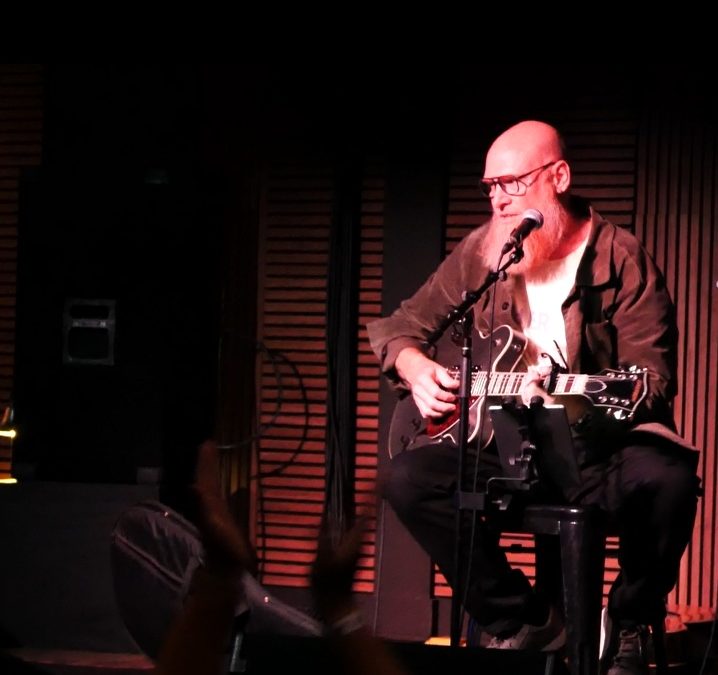By Trevor Potts
“A poem will not stop a bullet. A novel can’t defuse a bomb,” once wrote author Salman Rushdie. “But we are not helpless. We can sing the truth, and name the liars.”
On a recent Thursday night in Broadripple, Indiana, the audience in attendance at venue Turntable witnessed the emergence of a new voice on the musical scene, one whose raw passion and conviction powerfully address the current historical and political moment. Mike Culver, a lifelong educator who for years taught Government and American History in high schools, confesses that he provides no answers through his music – and yet, for many in attendance that night, his music served as a call to action for anyone who believes in the power of music to challenge and resist. “These songs were therapeutic, and cathartic, for me to write and perform,” said Culver, in a subsequent interview with Where Words Ignite Worlds. “They were very much a personal motivation. At this point, I don’t plan to change the world … Still, if they strike a similar chord in the listener, all the better.” Culver’s set at Turntable was only his second live show, but for the nearly 100 guests, his music did just that.
Culver’s “unapologetically opinionated” set list for his show included such original songs as “Trump’s First Term,” reflecting on the reemergence of the former President from near political ashes after the January 6 riots, and “Deep Thoughts by JD and Marco,” the lyrics of which are drawn entirely from actual quotes over the years from the current Vice-President and Secretary of State, about the character of their boss in the Oval Office. “Cabinet Worship Song” continued that thread of sharp critique, holding a mirror to the daily fealty being demonstrated by the President’s appointees, and the consequences of silence in the face of what Culver describes as impulses of authoritarianism, demagoguery and autocracy.
Clearly, the singer’s background as a teacher of Government and American History informs much of his work, and in the spirit of one of his heroes, George Carlin, Culver announced at the beginning of his set, “You don’t have to agree with everything or anything (I say). You just have to agree that we all – including me tonight – have the Constitutional, Bill of Rights and First Amendment right to say it.” And say it, Culver does, with lyrics as poetic as they are cutting, on the current historical and political moment.
During his set, Culver wove in a little known song by folk legend Woody Guthrie about Fred Trump, father of the sitting President. Guthrie wrote the song in 1954, describing what he viewed as the racist housing practices and discriminatory rental policies of his landlord, Mr. Trump senior. Channeling Guthrie, Culver sang:
I suppose Old Man Trump knows
Just how much
Racial Hate
He stirred up
In the bloodpot of human hearts
When he drawed
That color line
Here at his Beach Haven family project
Culver’s performance at Turntable concluded with a song in which the singer “dreams of a world where January 6, 2021, had a different outcome” – rather than the one we all know, which Culver states would have left historical figures such as Anne Frank and James Madison “very sad.” Culver’s alternative dream is one wherein The Constitution, Bill of Rights, the defense of women’s autonomy, and standing up to fascism would have been protected that day, and each day since. Perhaps Culver’s most poignant song to me personally was one titled “Feeling Replaced” about the allure of MAGA to those grappling with perceived cultural displacement in much of America’s heartland, including our own here in Indiana.
As for what is next for the singer, Mike Culver is not certain, but given how powerfully his performance resonated with the audience, he knows he would like to continue to perform his cultural critique on the road, likely next to Ann Arbor, Michigan, and Windsor, Canada, two locations close to his heart from his upbringing in Detroit. “I don’t think my goal is to become so big that it comes with a level of strife,” he says – akin to the rise of political, neo-folk contemporary artists such as Jesse Welles, among others. And yet, it is clear that Culver believes that his is a message important enough to continue conveying. He reflects on some his musical influences in R.E.M., Bob Dylan and U2, whose early song “Sunday Bloody Sunday” made Culver think, “Holy shit, that guy’s singing about politics … For me, personally, I need to do that too.”
Fundamentally, however, as he expressed in his interview with Where Words Ignite Worlds, Mike Culver views his central task as being the preservation of rigorous cultural critique and free speech in the current environment. “I’ve never served in the military, but if I did,” he reflects, “I guarantee I would be laying down my life for the First Amendment” for all, even for those with whom we may most vigorously disagree.
Such a message, in this author’s humble opinion, is exactly what is needed in this time of all-to-common acquiescence to perceived authority. I was grateful to be in the presence of Mike Culver for his powerful July performance at Turntable, and to be afforded the opportunity to speak with him further for this interview. It is certain that we will hear more from this emerging cultural voice – part poet, part barbaric yawp – very soon.
